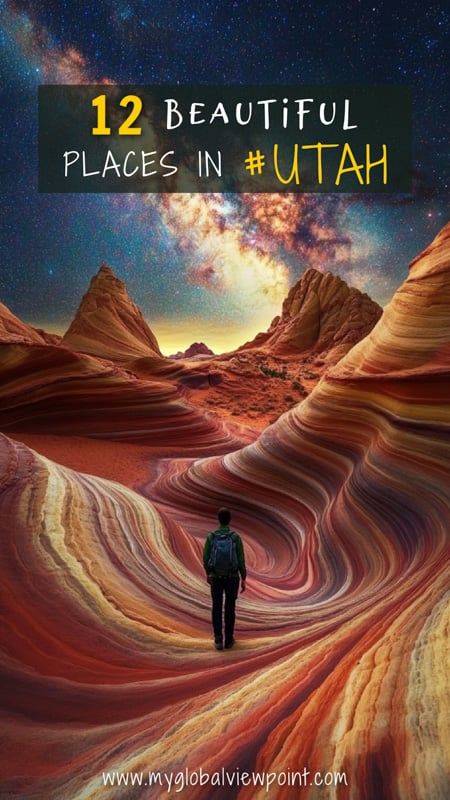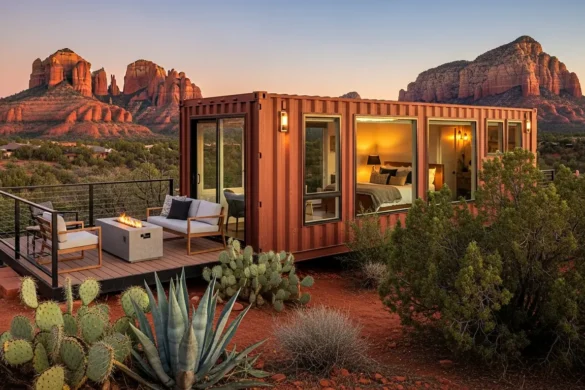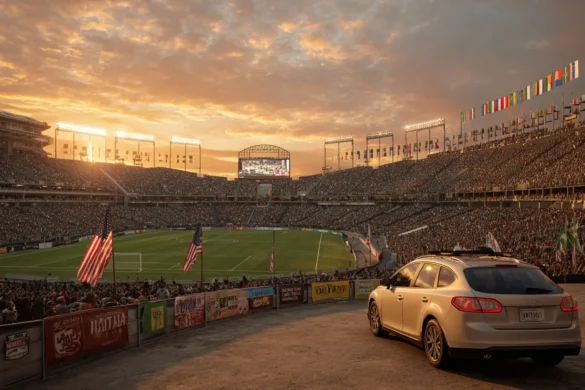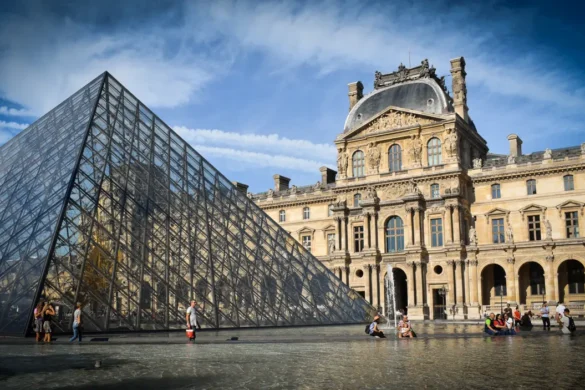Utah is seriously one of the most epic states in the US, and after visiting over a dozen times and hitting all five national parks, I can tell you—it’s an absolute bucket list destination. From Zion’s massive cliffs and Bryce Canyon’s wild hoodoos to off-the-radar spots like Goblin Valley and the Bonneville Salt Flats, Utah’s landscapes are straight-up next level.
Whether you’re into hiking, snapping Insta-worthy shots, or just soaking in crazy-good views, this state has it all. In this guide to the 12 coolest and most beautiful places in Utah, I’m sharing my favorite iconic spots and hidden gems that will blow your mind. Ready to explore one of the most stunning places in the US? Let’s go! 🏜️🔥
The Most Beautiful Places to Visit in Utah
From otherworldly national parks and reservations to iconic cities and Wild Western towns, here are all the prettiest locations in Utah you should know about.

1. Arches National Park
Look, I’ve been to a lot of places with red rocks, but Arches is just next level. This place has over 2,000 natural sandstone arches – the highest concentration anywhere on Earth. Delicate Arch is basically Utah‘s unofficial symbol, and honestly, seeing it in person is way more impressive than any postcard.
Here’s what you need to know for 2025: Arches now requires timed entry reservations from April 1-July 6 and August 28-October 31 between 7am-4pm. The good news? No reservations needed during the hottest part of summer (July 7-August 27). Timed entry tickets cost just $2 plus your regular park entrance fee ($30 per vehicle), and you can book them up to 6 months in advance on Recreation.gov starting January 2, 2025.
I always recommend hitting Delicate Arch at sunrise – the soft light makes that red sandstone absolutely glow. The hike is 3 miles round-trip and moderately challenging, but totally worth it. For something easier, Balanced Rock and Double Arch are right off the main road. If you’re feeling adventurous, tackle the 7.8-mile Devils Garden Trail to see eight different arches, including 306-foot Landscape Arch. After sunset, stick around for some incredible stargazing – Arches is a certified International Dark Sky Park.

2. Bryce Canyon National Park
Ready to feel like you’re walking through a fantasy land made of stone? Bryce Canyon isn’t actually a canyon at all – it’s a collection of natural amphitheaters filled with thousands of red, orange, and pink rock spires called hoodoos. I’ve been here multiple times, and it still makes my jaw drop every single visit.
The park entrance fee is $35 per vehicle (valid for 7 days), and honestly, that’s a steal for what you get. The Rim Trail is mostly flat and paved, perfect for all skill levels and offering killer views of Bryce Amphitheater. But the real magic happens when you hike down into the hoodoos themselves. The Queens Garden Trail is the easiest descent at just 1 mile, while the Navajo Loop connects through the famous Wall Street slot canyon.
At 8,000+ feet elevation, Bryce has some of the darkest night skies in America. The ranger-led astronomy programs are incredible – I’ve seen Saturn’s rings and distant galaxies through their powerful telescopes. Pro tip: come for sunrise at Bryce Point when the amphitheater literally lights up like it’s on fire. Winter visits are magical too, with snow-dusted hoodoos and way fewer crowds, though some roads may be closed depending on conditions.

3. Zion National Park
Zion flips the typical canyon experience completely upside down. Instead of standing on the rim looking down, you’re walking through the canyon floor gazing up at massive 2,000-foot sandstone walls. It’s honestly one of the most unique landscapes I’ve ever experienced, and the hiking here is absolutely world-class.
The park entrance fee is $35 per vehicle for 7 days. From March through October, you’ll need to take the free shuttle system to get into Zion Canyon – no private vehicles allowed, which actually makes the experience way more peaceful. The two must-do hikes are Angels Landing (if you can handle heights and chains) and The Narrows, where you’re literally walking upstream through the Virgin River with canyon walls just 20 feet apart.
I love The Narrows because it’s completely different depending on water levels and seasons. In summer, the water’s warm and flows are typically lower, making it perfect for families. Spring can have higher water and colder temps, so you’ll want a dry suit or at least neoprene socks. The Riverside Walk to the start of The Narrows is paved and accessible to everyone. For Angels Landing, you’ll need permits now (they’re free but required), and honestly, that final half-mile with chains and 1,000-foot drop-offs isn’t for everyone – but the views are absolutely insane.
- Read next: Things to Do in Zion National Park

4. Monument Valley
Stepping into Monument Valley is like walking onto every Western movie set you’ve ever seen. These iconic red sandstone buttes rising from the desert floor have defined the American West in countless films, from John Ford classics to Forrest Gump‘s famous running scene. It’s honestly one of the most photographed landscapes in the world.
Monument Valley sits within Navajo Nation, so you’re paying tribal fees, not national park fees. Entry is $20 per vehicle for the scenic drive. The 17-mile Valley Drive is mostly dirt roads with incredible viewpoints of The Mittens, Merrick Butte, and other famous formations. Your regular car can handle it, but take it slow and watch for potholes.
What makes this place special is the Navajo-guided tours that access restricted areas. I did one that took us to Big Hogan, a natural stone amphitheater with incredible acoustics, and learned about Navajo culture and traditions. These tours cost around $75-100 per person but give you perspectives and photo opportunities you can’t get on your own. Remember, you’re a guest on sovereign land – photography of residents requires permission, and some areas are off-limits for spiritual reasons. The transformation at sunrise and sunset is absolutely magical when the monuments glow like embers against the sky.
✈️ My #1 Hack for Cheap 2026 Flights:
It’s January, so flight prices are climbing fast—but you don't have to pay them. I’m currently seeing roundtrips to Europe for under $300 (deals you won’t find on Google Flights).
Step 1: Join Going.com's Free Plan here. It takes 10 seconds and requires no credit card.
Step 2: If you're doing a big trip this year, grab the 14-day free trial of Premium. You can even use my code JON25 for 25% off.
Seriously, this is the single best money-saving tool I’ve used in 8+ years.
👉 Send me cheap 2026 flights- Read next: Monument Valley Attractions & Activities

5. Capitol Reef National Park
Capitol Reef is Utah‘s best-kept secret, and honestly, I love that it gets way less crowded than the other parks. The centerpiece here is the Waterpocket Fold, a 100-mile wrinkle in Earth’s crust that creates this incredible landscape of cliffs, canyons, and colorful rock layers.
Park entrance is $15 per vehicle for 7 days, and most people only explore the Fruita area near the visitor center. But that’s where they’re missing out – Fruita is this historic Mormon settlement where you can still pick fruit from heritage orchards during harvest season. I love wandering through the old schoolhouse and homesteads while snacking on apples or pears.
The real gems are in the more remote areas. Cathedral Valley has these massive sandstone monoliths that look like temples rising from the desert floor. You’ll need a high-clearance vehicle for the Cathedral Valley loop, but it’s absolutely worth it for the solitude and dramatic landscapes. The Hickman Bridge Trail is an easy 1.3-mile hike to a natural bridge, while Cassidy Arch (named after Butch Cassidy) offers great views with moderate effort. Spring brings wildflowers, and fall has amazing colors when the cottonwoods turn golden along Fremont River.
- Read next: Scariest Hiking Trails in the World

6. Canyonlands National Park
Canyonlands is where you go when you want to feel absolutely tiny in the face of nature. This massive wilderness is carved by the Colorado and Green Rivers into four distinct districts, and honestly, it’s some of the most rugged and beautiful country in America.
Entry fees are $30 per vehicle for 7 days. Most people visit Island in the Sky district, which sits on top of a 1,500-foot mesa with panoramic views stretching over 100 miles. Mesa Arch at sunrise is absolutely iconic – the underside of the arch glows fiery red when the sun comes up. It’s a 30-minute hike, but get there early because it gets crowded.
The Needles district is where the real adventure happens. The colorful rock spires and complex trail system offer incredible hiking and backpacking opportunities. Chesler Park is this amazing grassy meadow surrounded by sandstone towers – it feels like a hidden world. The Maze is one of America‘s most remote wilderness areas, requiring serious backcountry skills and usually a 4WD vehicle. I’ve done the White Rim Road by mountain bike, and it’s honestly one of the most epic rides on the planet – 100 miles through incredible canyon country, though you’ll need multiple days and camping permits.

7. Lake Powell
Lake Powell creates one of the most surreal landscapes I’ve ever seen – sapphire blue water winding through towering red rock canyons. This massive reservoir stretches 186 miles and has nearly 2,000 miles of shoreline, creating endless opportunities for exploration.
There’s no entry fee for Lake Powell itself, but you’ll need to pay for boat rentals, which start around $400-500 per day for a small motorboat. Houseboating is the ultimate experience – you can rent these floating hotels for $2,000-4,000+ for 3-7 days and explore hidden coves that are completely inaccessible by land. I’ve done this with friends, and it’s honestly one of the best ways to experience the Southwest.
Rainbow Bridge National Monument is a must-see – one of the world’s largest natural bridges at 290 feet tall. You can only reach it by boat or a challenging backpacking trip. Antelope Canyon nearby requires separate Navajo permits and guided tours (around $60-80 per person), but those slot canyon photos you see everywhere are worth it. For photographers, Alstrom Point offers incredible panoramic views, especially at sunset. Water levels have been dropping due to drought, so some areas that were underwater a few years ago are now accessible for hiking and exploration.
- Read next: Unique Places to Visit in the US

8. Goblin Valley State Park
This place seriously looks like Mars – Goblin Valley has thousands of mushroom-shaped rock formations called hoodoos that create this absolutely bizarre landscape. It’s one of Utah‘s smaller parks, but honestly, it’s so unique that it’s become one of my favorites for just wandering around and exploring.
Utah state park fees are $20 per vehicle ($10 for Utah residents 65+). Unlike most parks with designated trails, you can scramble freely among these weird rock formations – it’s like a giant natural playground. I love how every rock looks different, and you can turn them into castles, animals, or whatever your imagination comes up with.
The Goblin’s Lair hike is a moderate 1.5-mile trek to this incredible underground chamber with light filtering in from above – it’s like a natural cathedral. Goblin Valley is also a certified International Dark Sky Park, so the stargazing here is phenomenal. Time your visit with a new moon, and you’ll see the Milky Way so clearly it’ll blow your mind. Little Wild Horse Canyon nearby offers an amazing slot canyon experience where you can squeeze through narrow passages between towering walls. Spring and fall are perfect for hiking, while summer can be scorching hot.

9. Dead Horse Point State Park
If you want that iconic American West view without the crowds of Grand Canyon, Dead Horse Point delivers in spades. This dramatic overlook sits 2,000 feet above the Colorado River, offering views that are honestly just as spectacular as any national park.
Entry fees are $20 per vehicle ($10 for Utah residents 65+). The main overlook is just a short walk from the parking area, making it accessible for everyone. I’ve been here dozens of times, and I still can’t get over how the river makes this perfect horseshoe bend through red rock canyons with the La Sal Mountains in the distance.
The Intrepid Trail System offers world-class mountain biking with routes for all skill levels. The views while riding these trails are absolutely insane – you’re literally riding along cliff edges with massive canyon vistas. For hiking, the 5-mile Rim Trail connects several viewpoints and gives you different perspectives on the canyon. Sunset here is magical – watching the light change on the red rocks while the river reflects the sky colors is honestly one of the most beautiful sights in Utah. Camping is available if you want to wake up to sunrise over the canyons.

10. Antelope Island State Park
Antelope Island feels like Utah‘s version of an African safari, and I’m not even exaggerating. This 28,000-acre island in the Great Salt Lake has over 500 free-roaming bison, plus pronghorn antelope, bighorn sheep, and incredible bird watching opportunities.
Entry is $20 per vehicle plus a $2 causeway fee to cross onto the island ($10 for Utah residents 65+). The drive across the causeway is pretty cool – you’re literally driving across Great Salt Lake to reach this isolated island. Frary Peak is the highest point at 6,596 feet, and the 6.6-mile round-trip hike offers panoramic views of the entire Salt Lake Valley.
Bridger Bay Beach is where you can experience floating in the super-salty water – it’s impossible to sink, though be warned about the brine flies in summer (they’re harmless but annoying). I love the Buffalo Point Trail for sunset views and wildlife spotting. Spring brings wildflower displays and newborn bison calves, while fall features the annual bison roundup, which is pretty incredible to witness. The stargazing here is fantastic since there’s minimal light pollution. Fair warning: the visitor center is currently closed for construction, but temporary facilities are available at the marina.

11. Snow Canyon State Park
Snow Canyon gives you Zion-quality landscapes without the crowds and tour buses. This 7,400-acre park showcases this incredible collision between ancient lava flows and brilliant Navajo Sandstone cliffs in shades of red and cream.
Entry is $20 per vehicle ($10 for Utah residents 65+), and honestly, it’s one of the best deals in Utah. The Petrified Dunes Trail lets you walk across ancient sand dunes that turned to stone – the swirling patterns in the rock are absolutely beautiful. Jenny’s Canyon is so narrow you can touch both walls at the same time, while the Butterfly Trail leads to lava tubes where you can descend into the volcanic underworld.
Despite its name, Snow Canyon rarely sees snow, making it perfect for winter hiking when other Utah parks are cold and inaccessible. The contrast between black lava rock and red sandstone creates some of the most unique photo opportunities in the state. Pioneer Names trail shows signatures carved by early Mormon pioneers in the 1800s. I always recommend timing your visit for golden hour when the canyon walls literally glow from within. Scout Cave is a fun scramble to a large alcove with great views, though you’ll need to do some easy rock climbing to reach it.

12. Cedar Breaks National Monument
Think Bryce Canyon without the crowds and you’ve got Cedar Breaks. This massive natural amphitheater sits at over 10,000 feet elevation and showcases incredible red rock formations in a much more intimate setting.

Entry is $15 per vehicle for 7 days. The Point Supreme Overlook offers jaw-dropping views into the 3-mile-wide amphitheater that plunges 2,000 feet deep. The colors here are incredible – layers of red, orange, and purple rock creating this natural masterpiece. Sunset Point is perfect for evening photography when the light hits the formations just right.

Cedar Breaks really shines during wildflower season (mid-July through August) when the high-elevation meadows explode with color. The Wildflower Festival happens annually and features guided walks with botanists. As a certified International Dark Sky Park, the stargazing here is phenomenal – ranger-led astronomy programs take advantage of the crystal-clear mountain air. Winter transforms the monument into a snowy wonderland accessible only by snowshoe or cross-country skis, but honestly, the solitude and beauty are incredible if you’re prepared for the cold. The Alpine Pond Trail is a beautiful 2-mile hike through meadows and forests when conditions allow.

Global Viewpoint is a personal blog. All content is for informational and entertainment purposes only and does not constitute professional financial, medical, or legal advice.





